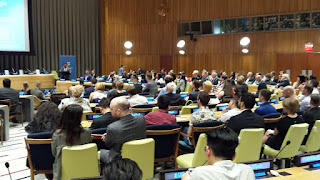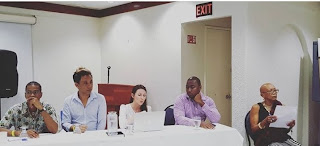C-FAM at the UN
Posted December 29th, 2012
Jan 12, 2012
Russia and Other States Move to Reform Broken Treaty System
By Timothy Herrmann
NEW YORK, January 13
(C-FAM) Wresting many delegations from their vacation slumber, Russia
held an informal meeting early this week to propose a resolution calling
for states to take a central role in the restructuring and reform of
treaty monitoring and compliance.
Until now, the Office of the High Commissioner of Human Rights, a
bureaucratic office located in Geneva, has dominated the reform process
and limited the role of member states to the submission of formal
statements. Russia has intervened and demanded that more power in the
reform process be placed in the hands of governments. Russia wants to
“conduct open, transparent, and inclusive negotiations on the issue of
the reform of the human rights treaty body system” giving them a leading
role in the reform process.
Intertwined with reform process, there are two underlying issues. First, treaty monitoring bodies are years behind in their work. The reason for this is that they are notoriously short staffed and inefficient. Moreover, the reporting requirements are onerous and voluminous. Small states in particular find it very difficult to keep up with the requests of the treaty monitoring bodies.
As important as the work load and the inefficiency of the process, there is also the problem of the treaty monitoring bodies overstepping their mandate and giving governments directives that have nothing to do with the treaties themselves. Additionally, states are critical of treaty monitoring bodies that rewrite these hard law treaties and then try to hold states accountable to the revisions. But this week, it was a fight over the reform process itself. In fact, the meeting was held outside of the formal reform process and pitted the EU, the United States, Canada, New Zealand, Switzerland and Norway against Russia, Benin, Pakistan and the Caribbean nations.
Smaller countries, like those in the Caribbean, complain that they do not have a real voice in the reform process and that their concerns will therefore not be met. They were quick to point out that the Russian resolution would allow countries that can’t afford offices in Geneva to be more directly involved in the process of reform. Benin echoed these sentiments and made it clear that with most of the reform process being conducted from Geneva under the auspices of OHCHR and the Human Rights Council (HRC), many countries felt their presence marginalized.
Benin and Pakistan went on to emphasize that treaty bodies were created by states, and that states have a vested interest in remaining their beneficiaries. If the reform process were to remain solely in the hands of a UN agency like the OHCHR, the voice of states runs the risks of being overshadowed by advocacy groups like the Center for Reproductive Rights, which do have the money to attend proceedings at the HRC, and who have used their presence to influence the debate on issues like abortion in the past.
Intertwined with reform process, there are two underlying issues. First, treaty monitoring bodies are years behind in their work. The reason for this is that they are notoriously short staffed and inefficient. Moreover, the reporting requirements are onerous and voluminous. Small states in particular find it very difficult to keep up with the requests of the treaty monitoring bodies.
As important as the work load and the inefficiency of the process, there is also the problem of the treaty monitoring bodies overstepping their mandate and giving governments directives that have nothing to do with the treaties themselves. Additionally, states are critical of treaty monitoring bodies that rewrite these hard law treaties and then try to hold states accountable to the revisions. But this week, it was a fight over the reform process itself. In fact, the meeting was held outside of the formal reform process and pitted the EU, the United States, Canada, New Zealand, Switzerland and Norway against Russia, Benin, Pakistan and the Caribbean nations.
Smaller countries, like those in the Caribbean, complain that they do not have a real voice in the reform process and that their concerns will therefore not be met. They were quick to point out that the Russian resolution would allow countries that can’t afford offices in Geneva to be more directly involved in the process of reform. Benin echoed these sentiments and made it clear that with most of the reform process being conducted from Geneva under the auspices of OHCHR and the Human Rights Council (HRC), many countries felt their presence marginalized.
Benin and Pakistan went on to emphasize that treaty bodies were created by states, and that states have a vested interest in remaining their beneficiaries. If the reform process were to remain solely in the hands of a UN agency like the OHCHR, the voice of states runs the risks of being overshadowed by advocacy groups like the Center for Reproductive Rights, which do have the money to attend proceedings at the HRC, and who have used their presence to influence the debate on issues like abortion in the past.



Comments
Post a Comment